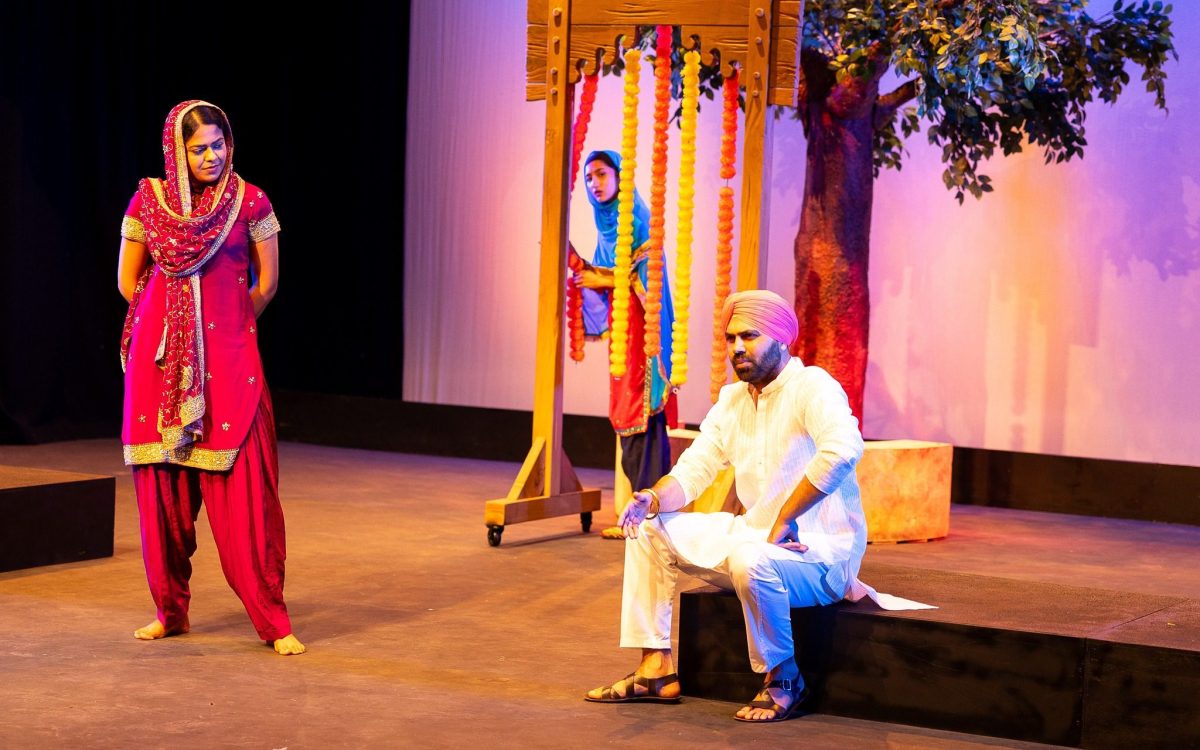The Final Line: The Untold story of India’s Great Divide is a sad and heartfelt collection of stories about one of the most devastating, horrible and influential moments of modern history – the British partition of India. This new ensemble theatre work runs around 100 minutes with no intermission and is the debut full-length work from The Great Indian Theatre Company.
By turns epic, grand and farcical, The Final Line refers to the state borders drawn during the British partition of India at the moment of its independence and the founding of the state. This historical moment is complex and there are persistent myths. While this reviewer does not claim to be an expert, we do know that this moment was a violent administrative crime, resulting in one of the largest mass migrations in history and that it exacerbated divisions in communities among different social and religious groups – divisions that were encouraged by the British during their centuries-long oppressive colonial rule.
One cannot imagine the difficulty of putting together a play that attempts to encapsulate this history and to tell this story to people who may be unaware of this moment and to people whose families have lived it. There were banners in the theatre lobby, before the start of the play, of various pictures from the Partition and information about Vibhajan Vibhishika Smriti Diwas (Partition Horrors Remembrance Day) on 14 August. This sets up the play as a historical retelling and, while historical figures were in it, this reviewer’s experience of the play made it seem more like an at turns sweet, at turns saccharine, poetic reimagining of partition.
The Final Line begins in a fictional village called ‘Khuseepind’, where Muslim, Sikh and Hindu neighbours rejoice in the news of the Indian Independence Act of 1947 and anticipate the announcement of the state borders. There are multiple narratives woven throughout the play: a romantic subplot between a Sikh boy and a Muslim girl, a conversation with Gandhi about his abstention from the administrative process, conversations with key political figures of the time (such as Muhammad Ali Jinnah), rising tensions and violence between religious groups, and long humorous scenes with the British administrators responsible for drawing the partition lines. With a cast of 25, The Final Line is a complex, fascinating, passionate and messy work that attempts to humanise and make accessible the people caught in this moment in history. The audience was extremely receptive, clapping after every scene and offering a standing ovation.
The vitality of The Final Line was inspiring, particularly because of the importance of the subject matter and the importance of bringing this narrative to communities in Perth, too, where more people should be aware of the history of the Partition of India and its significance for Desi communities in Australia.
There were some moments where the play was let down by its writing and direction, such as clichés throughout the narrative and dialogue that sometimes felt overwrought and clunky. A character literally says “…and that is…The Final Line” at the end of a long monologue about the difficult position that the British characters were placed in. There were also some moments with blocking where an actor would stumble or awkwardly hover nearby.
The tonal shift between some of the scenes was jarring. The large collection of stories overlaid upon each other meant that one of the emotional climaxes of the narrative, that of the fate of the star-crossed lovers, was embroiled in a mess of a comic slapstick from the British administrators.
Ultimately, The Final Line simplified the history of the Partition within a dramatic narrative that would have benefited from holding on to some of the complexity of the moment. There are many oral histories and accounts of neighbours suddenly killing each other, but part of the draw of any narrative (whether historical or otherwise) is to unpack the complexity of a single moment on stage and in history – to explore the gaps and silences in the oral histories and to understand how the heart of someone changes.
Read: Theatre review: Is That You, Ruthie?, Cremorne Theatre
Last, The Final Line could have ascribed more responsibility to the British in their role in stoking divisions among British India for over a century to ensure their rule over the colony. There was an opportunity in doing so to deepen the relationship that each character has with their history, community and faith, and how this led to conflict between religious and ethnic divisions persisting to the present. What we have instead is a messy, humanist and passionate play with potential to develop into a show that is special and powerful.
The Final Line: The Untold story of India’s Great Divide
The Great Indian Theatre Company
Written and directed by Sreekanth Gopalakrishnan
Producer: Dr Veena Chandran
Production Manager: Rani Ramachandran
Background score: Sumesh Anand Surya
Vocals: Rabica Wadhwan
Flute: Rahul Krishnan
Choreography: Sindhu Nair
Make-up and Hair: Bhumi Panchal
Audio cue manager: Paramjit Kaur
Art Direction, set and props: Rob Downie and Albert Chanikutty
Cast: Aryan Menon, Ashish Malik, Ashok Radhakrishnan, Atul Sinha, Bimal Kaul, Dilip Ajwani, Garrison Cox, Geo John, Geoffrey Leeder, Gopu Nayar, Jose Dev Vattoly, Karishma Velugula, Karthika Nair, Matthew Docking, Naomi Ottley, Navneet Bhullar, Neha Chhapia, Nidhi Wilson, Prasanna Dixit, Robert McDonough, Rohit Kalia, Sanjay Khanna, Venu Somasundaran, Yagnesh Rajendran and Zachary Borthwick
The Final Line was performed at Nexus Theatre, Murdoch University, WA from 24-25 November.
This review is published under the Amplify Collective, an initiative supported by The Walkley Foundation and made possible through funding from the Meta Australian News Fund.
This review has been amended for factual errors following publication.





